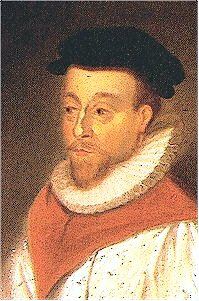

|
|
| Musical Musings: Composers |
Orlando GibbonsThis article appears online in Wikipedia: The Free Encyclopedia
Gibbons was born in Oxford. Between 1596 and 1598 he sang in the choir of King's College, Cambridge, where his brother was master of the choristers; he entered the university in 1598 and achieved the degree of Bachelor of Music in 1606. James I appointed him a Gentleman of the Chapel Royal, where he served as an organist from at least 1615 until his death. In 1625 he became senior organist at the Chapel Royal, with Thomas Tomkins as junior organist. He also held positions as keyboard player in the privy chamber of the court of Prince Charles (later King Charles I), and organist at Westminster Abbey. He died an early death in Canterbury of apoplexy, and a monument to him was built in Canterbury Cathedral. One of the most versatile English composers of his time, Gibbons wrote a quantity of keyboard works, around thirty fantasias for viols, a number of madrigals (the best-known being The Silver Swan), and many popular verse anthems. His choral music is distinguished by his complete mastery of counterpoint, combined with his wonderful gift for melody. Perhaps his most well-known verse anthem is This Is the Record of John, which sets an Advent text for solo countertenor alternating with full chorus. The soloist is required to demonstrate considerable technical facility at points, and the work at once expresses the rhetorical force of the text, whilst never being demonstrative or bombastic. He also produced two major settings of Evensong, the Second, and the 'Short' service. The former is an extended composition, combining verse and full sections, and the latter possesses a beautifully expressive Nunc Dimittis. Gibbons' full anthems include the expressive 'O Lord in thy wrath', and the Palm Sunday setting of 'O clap your hands together' for 8 voices. He contributed six pieces to the first printed collection of music in England, Parthenia (of which he was by far the youngest of the three contributors), published circa 1611. |
 Orlando Gibbons (baptized, December 25, 1583 — died, June 5, 1625) was an English composer and organist of the late Tudor and early Jacobean periods.
He was a leading composer in the England of his day.
Orlando Gibbons (baptized, December 25, 1583 — died, June 5, 1625) was an English composer and organist of the late Tudor and early Jacobean periods.
He was a leading composer in the England of his day.